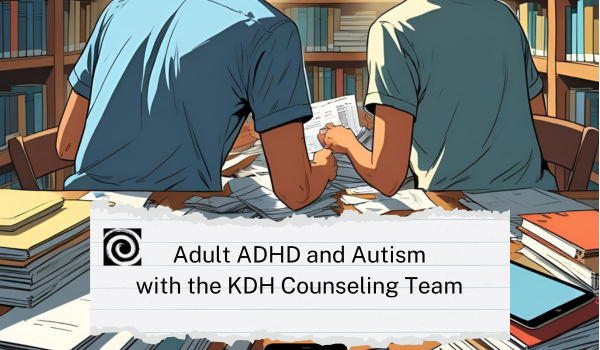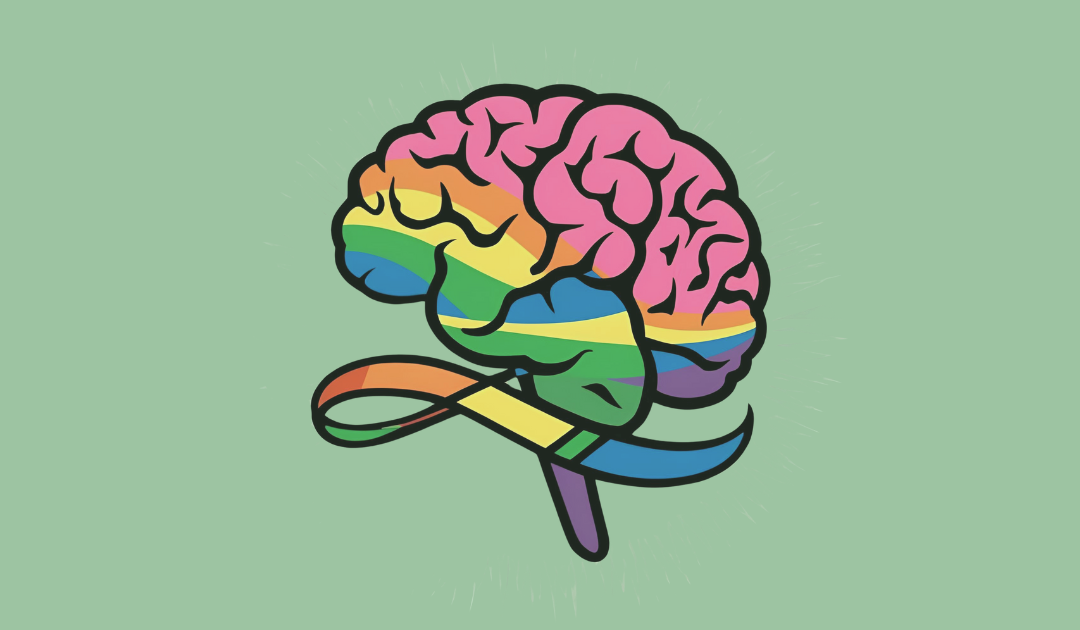Understanding Psychological Evaluations for ADHD in Adults
Attention-Deficit/Hyperactivity Disorder (ADHD) is often mischaracterized—reduced to images of fidgety schoolchildren or distracted professionals...
4 min read
KDH Counseling Team : Aug 1, 2025 1:25:10 PM

In recent years, more adults are seeking answers to questions they’ve carried with them for decades, even if they only recently found the language for them:
“Why has everything always felt harder for me than for others?”
“Why doesn't anyone else seem to get me?”
“Why do I feel overwhelmed by noise, disorganized in my thoughts, but hyper-focused on work projects?”
“Am I burned out… or has something been missed?”
As awareness of adult ADHD and Autism increases, so does the need for clients to find clinicians who can provide accurate, comprehensive, and individualized assessments of their symptoms and give them some answers to those questions they have been carrying all along.
In integrated clinics that offer both psychological testing and psychiatric services, evaluations might be offered by both licensed psychologists and psychiatric nurse practitioners (PMHNPs). Both roles are important, but they approach the diagnostic process from different angles, with different tools and goals. When used together, they offer not just answers-but also a way forward from diagnosis.
This blog explores the distinct but complementary roles of psychologists and psychiatric nurse practitioners in evaluating adult ADHD and Autism, and how their collaboration can transform the diagnostic and treatment journey.
Many adults grew up without language for their neurodivergence. They learned to “mask,” overcompensate, or internalize their struggles. ADHD is often missed in women, people of color, and those with strong academic coping skills. Autism-particularly in those without intellectual disability-was misunderstood or misdiagnosed entirely.
Today, more adults are identifying patterns they can no longer ignore:
Recurrent job or relationship difficulties
Emotional dysregulation, sensory overload, executive functioning struggles
Whether seeking accommodations, therapeutic support, or just answers, the evaluation process is often the first real mirror many adults have ever looked into.
So who holds the mirror-and what exactly are they reflecting?
Evaluations for adult ADHD and Autism conducted by a psychologist are comprehensive, standardized, and often several hours long. These evaluations go beyond simple symptom checklists (though sometimes checklists can be included) to get a full picture of someone's life and how their brain works. These can sometimes take several hours.
A process called differential diagnosis, which helps them figure out if your symptoms are from ADHD, Autism, trauma, or other conditions.
A detailed written report with a diagnosis and personalized recommendations.
While a psychologist provides a deep, detailed diagnosis, a psychiatric nurse practitioner (PMHNP) focuses on your current symptoms and how medication might help. They are trained to diagnose mental health conditions and prescribe medicine.
What an evaluation with a PMHNP includes:
A psychiatric and medical history review.
A look at your current symptoms, such as trouble sleeping, anxiety, or emotional outbursts.
A discussion about any past medications you've tried.
A 60 to 90-minute interview.
Symptom checklists like the PHQ-9 or GAD-7.
An assessment of how you're functioning at work and in relationships.
A plan for medication and follow-up care.
A PMHNP's role is not to give you a diagnosis for accommodations. Instead, they want to answer the question: "What's getting in the way right now, and how can medication help?"

Both providers may give a diagnosis, but only the psychologist uses standardized psychological testing to support that diagnosis. At KDH Counseling, only the PMHNP prescribes medication and monitors its effects.
In integrated clinics, the collaboration between psychologists and psychiatric nurse practitioners creates a more holistic view of adult neurodivergence. Here’s how that might look:
Sometimes, the best approach is to see both professionals. They can work together to give you the most complete care.
A woman has spent her life trying to fit in, but is now feeling exhausted and has trouble with relationships.
The psychologist does an evaluation and diagnoses her with Autism. They explain how her lifelong habits and behaviors are connected to this.
The PMHNP helps her with her anxiety and sleep problems, and suggests medication and lifestyle changes that make her more comfortable.
Together, they help her understand her diagnosis and find ways to manage her life.
A person struggles with disorganization and strong emotions, and has a history of trauma.
The psychologist evaluates for both ADHD and trauma, finding that both are a factor.
The PMHNP adjusts medication to avoid making their anxiety worse, , while working with their therapist to address the trauma.
By combining their expertise, they treat the whole person, not just one part of the problem.
See a psychologist when:
You need a formal diagnosis for work, school, or other official purposes.
You're not sure if it's ADHD, Autism, or something else
like trauma.
You want a deeper understanding of your lifelong patterns.
See a PMHNP when:
You're experiencing difficult symptoms right now (like attention problems or panic) and want to explore medication.
You've taken medication before and need to adjust it.
When you're not sure, it's often a good idea to start with a psychologist for a comprehensive evaluation. Then, you can work with a PMHNP for ongoing treatment.
In the end, psychologists and PMHNPs are not in competition. They each provide a different piece of the puzzle. Working together, they can help you find a path forward.
Getting a diagnosis for Adult ADHD and Autism can be complicated. These conditions don't always look the way they do in books, and often they can feel so "normal" within a family where many folks are struggling in the same or similar ways. Many adults have gone for years without a correct diagnosis, finding ways to cope that often cause more harm than good.
When doctors and other professionals work together, they can provide better care. A psychologist and a psychiatric nurse practitioner are like two different tools that give a more complete picture of a person. Each one sees things the other might miss.
An evaluation isn't the final step-it's the beginning. It's a chance to understand what has been happening and to start asking, "What comes next?"

Attention-Deficit/Hyperactivity Disorder (ADHD) is often mischaracterized—reduced to images of fidgety schoolchildren or distracted professionals...

There’s a quiet knowing some people carry—a long-held sense that they’ve always moved through the world a little differently. Not wrongly, just… not...

At KDH Counseling, our therapists specialize in a number of different areas, one of which being their ability to provide neurodiversity-affirming care